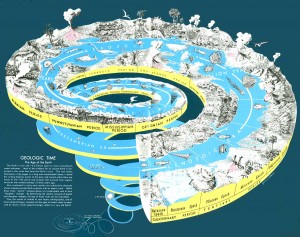Prof David Zeitlyn, University of Oxford, Institute of Social and Cultural Anthropology and Fellow, Wolfson College
A common typo (for bad typists such as myself) for Pasts is Pasta. Which suggests a potent range of metaphor: I’m not sure if this is a lasagne, rigatoni or perhaps a pasta dish: putanesca.
Bishop James Ussher did arithmetic and came up with an answer,  4004 BC. Anything before then is null. If I have understood it correctly, in Ussher’s account a creator (that some might see as malign or mischievous) produced fossils and rocks in the process of radioactive decay (nb radioactive decay only identified post-Ussher) amenable to the interpretation as being older, as if processes were continuous (which on Ussher’s account they are now but were created midway, as it were).
4004 BC. Anything before then is null. If I have understood it correctly, in Ussher’s account a creator (that some might see as malign or mischievous) produced fossils and rocks in the process of radioactive decay (nb radioactive decay only identified post-Ussher) amenable to the interpretation as being older, as if processes were continuous (which on Ussher’s account they are now but were created midway, as it were).
A different form of creationism is social construction – our understanding of pasts (and futures) is the result of work done by authors in their own presents. So pasts, futures are entangled in our presents, in what could be called presences of pasts and futures… But what then when (Ussher excepted), we start to think in the long term, in geological time scales such as 1 million years BC? This was the title of a Hollywood film famous in some circles for its anachronisms such as Raquel Welch wearing a fur bikini. But if Raquel Welch were not constructed then what?
I can imagine Woolgar or Latour’s accounts about the use of evidence to construct an understanding, detailing the uncertainties and the politics at arriving at a consensus. But such accounts fall or duck the realist projection motivating the actors (a move I am sure they would trumpet as a positive), yet it strikes me as being worrying like Bishop Ussher.
 The geological assertion is that even if all these accounts are wrong, there was a planet here in which stuff was happening, so there is/was something to be wrong about. Similarly if we pick a date far into the future but before the sun explodes, there will be a planet even if unpopulated by large or medium-sized mammals. This is dangerous ground. It invites us to think of independent existences and to take the view from nowhere and nowhen.
The geological assertion is that even if all these accounts are wrong, there was a planet here in which stuff was happening, so there is/was something to be wrong about. Similarly if we pick a date far into the future but before the sun explodes, there will be a planet even if unpopulated by large or medium-sized mammals. This is dangerous ground. It invites us to think of independent existences and to take the view from nowhere and nowhen.
My middling approach is to accept both independent existences and that there are no godly perspectives (accessible to humans). So we may have to accept that our access to (or our knowledge of) distant pasts and futures is weak, patchy, incomplete – or frankly, nugatory.

